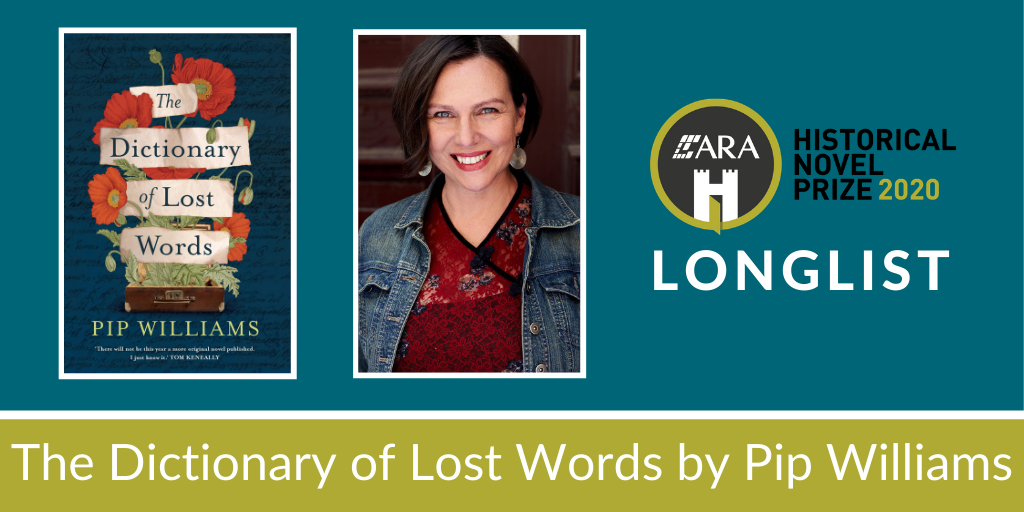HNSA, in partnerships with ARA Group, recently announced the eight talented authors, and their outstanding novels, selected in the 2020 longlist for the inaugural ARA Historical Novel Prize. The Dictionary of Lost Words by Pip Williams was one of the novels featured in the longlist. We chat with Pip below about why she entered the prize and what historical fiction means to her. You can also enjoy Pip reading an excerpt from her book via the HNSA Youtube channel. Subscribe to hear more book readings from the longlist authors in the coming weeks.
“In her character’s observations of, and later role in, the creation of the Oxford English Dictionary, Pip Williams elegantly demonstrates the unconscious biases in how language is codified. Set at the time of the women’s suffrage movement in England, it reclaims and celebrates women’s language.”
~ Linda Funnell, Judge, ARA Historical Novel Prize

What does being longlisted mean to you?
“It might not surprise you to know that one of the first things I did was look up the meaning of Longlisted in the dictionary – essentially, it means to be selected for consideration. It could be for a job or a scholarship or prize. In my case, it means that this novel, which I have loved and nurtured and written into being, has been appreciated by others as having some inherent value. It means it is good enough to be considered alongside other novels that have been loved a nurtured and written into being by their authors.”
“So, what you are really asking is what it means to be considered. In some ways that is a question at the heart of my book – and I can honestly say that being long listed for this Prize makes me feel like I’ve been heard; that the themes I explore in my book are as important today as they were in the early 20th century; that somehow, I have managed to express them in a way that resonates with readers. In short, it is satisfying and humbling and thrilling.”
Why did you enter the inaugural ARA Historical novel Prize?
“I entered this Prize because a reader suggested it. They had enjoyed the way my book wove the fictional story of a woman through the history of the Oxford English Dictionary. I think they appreciated the way fiction can present a different perspective on history and how that new perspective can challenge what we think about the present. They sent me the link to the prize, and I clicked on it.”
Why do you think awards like this are important?
“This is my first novel, so I am new to the opportunities literary prizes can offer books and their authors. But I have always been a reader, and I have been introduced to so many wonderful books I might not otherwise read, because they have been considered for literary prizes.”
“I am acutely aware that an award, of any kind, is going to reflect all kinds of subjective decisions. That the longlist from one group of judges might be different to the longlist from another group of judges. But awards are important because they introduce books, and the ideas within them, to readers. They kick start conversations that can extend beyond book groups and have an influence on social, cultural and political discussions. They acknowledge the value of the arts, and in some cases, they are the greatest form of financial renumeration for the prize winner. In the absence of economic security, that can’t be underestimated.”
What is the value of historical fiction?
Historical fiction is important because it helps us reflect on the past, and learn from it, but it also helps us read between the lines of accepted history. If we think history has so often been written by the victors, and so often written by men, there is a lot missing. So I think historical fiction is a really accessible way for readers, in particular, to access alternative narratives. As a writer, I find it an incredibly enjoyable, satisfying and fulfilling way to spend my time exploring, examining, and critiquing history to understand it better.
About Pip Williams
Pip was born in London, grew up in Sydney and now calls the Adelaide Hills home. She is co-author of the book Time Bomb: Work Rest and Play in Australia Today and in 2017 she wrote One Italian Summer, a memoir of her family’s travels in search of the good life, which was published with Affirm Press to wide acclaim. Pip has also published travel articles, book reviews, flash fiction and poetry.
In The Dictionary of Lost Words she combines her talent for historical research with beautiful storytelling. She has delved into the archives of the Oxford English Dictionary and found a tale of missing words and the lives of women lived between the lines.
To learn more, visit Pip’s website.
About The Dictionary of Lost Words
In 1901, the word bondmaid was discovered missing from the Oxford English Dictionary. This is the story of the girl who stole it.
Motherless and irrepressibly curious, Esme spends her childhood in the Scriptorium, a garden shed in Oxford where her father and a team of lexicographers are gathering words for the very first Oxford English Dictionary. Esme’s place is beneath the sorting table, unseen and unheard.
One day, she sees a slip containing the word bondmaid flutter to the floor unclaimed. Esme seizes the word and hides it in an old wooden trunk that belongs to her friend, Lizzie, a young servant in the big house. Esme begins to collect other words from the Scriptorium that are misplaced, discarded or have been neglected by the dictionary men. They help her make sense of the world.
Over time, Esme realises that some words are considered more important than others, and that words and meanings relating to women’s experiences often go unrecorded. She begins to collect words for another dictionary: The Dictionary of Lost Words.
Buy The Dictionary of Lost Words.
The ARA Historical Novel Prize shortlist will be announced on Wednesday, 28 October, with the prize winner to be announced by both video broadcast and live stream in Sydney on the evening of Tuesday, 10 November 2020.




